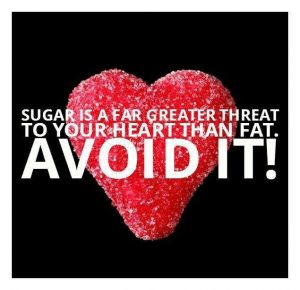5 Reasons to Cut Sugar Out of Your Diet

Remember when we used to vilify fat in our diet as the cause of heart disease and obesity? Well, it turns out that was all wrong. Thanks to the fat-free revolution, obesity in America has skyrocketed over the past 20 years, because when you remove delicious fat from food, you have to replace it with something else for flavor. Enter sugar, which is largely responsible for obesity rates doubling in seven states and increasing by 90 percent in others.
Sugar is the real culprit in heart disease as well, according to Harvard Health. A major study published in JAMA Internal Medicine found that people who consume 25 percent or more of their daily calories from sugar are more than twice as likely to die of heart disease as those who keep their sugar intake around 10 percent of their daily calories.
But heart disease and obesity aren't the only risks of consuming too much sugar. Here are five good reasons why you should reduce your sugar consumption or cut sugar out of your diet altogether.
- It can cause non-alcoholic fatty liver disease.
Sugar and high-fructose corn syrup, which are added in large quantities to myriad packaged foods, are half glucose and half fructose. While our bodies need glucose, it doesn't have much use for fructose, which can only be metabolized by the liver, where it immediately gets turned into fat. Some of this fat gets shipped to various parts of your body, but some of it stays in the liver and can cause non-alcoholic fatty liver disease.
- It's empty calories.
Empty calories are those which have no nutrients. High-sugar foods like ice cream, candy, pastries, and soda contain no nutrients, and if you eat a lot of these foods, you're probably not getting the nutrition you need to stave off illness and disease later on.
- It increases bad cholesterol and triglycerides.
The fat generated in the liver by sugar is rich in triglycerides and bad cholesterol, which reduces insulin sensitivity and causes an increase of visceral fat in the abdominal cavity. This can cause metabolic syndrome, which leads to obesity, diabetes, heart disease, and a shorter lifespan.
- It's addictive.
Eating sugar causes a dopamine release in the brain. This feel-good neurotransmitter is the same one that's activated by cocaine, and in fact, the National Institute of Health warns that not only is sugar as addictive as cocaine, but it can be even more rewarding and attractive to the brain, making it difficult to stop eating. People who have difficulty stopping their sugar habit may be addicted to it.
- It increases your risk of dying of cancer.
High sugar intake increases your risk of dying from colon cancer, breast cancer, and other cancers. A 2005 study found that women in remission from breast cancer have far lower blood glucose levels than those who succumb to the disease.
How Much Sugar Should You Eat?
It's probably impossible to cut all sugar out of your diet, but you really don't need to. The American Heart Association recommends that women keep their sugar consumption to less than 100 calories — about six teaspoons, or 24 grams — of sugar daily. For men, the recommended amount is 150 calories a day, which amounts to nine teaspoons, or 36 grams.
Remember that the sugar from fruits and vegetables doesn't damage your body the way processed sugar does. So, don't forego the bananas and oranges for fear of upping your sugar intake. In fact, you'll be far healthier if you reach for a sweet piece of fruit when you're feeling peckish for sugar.
